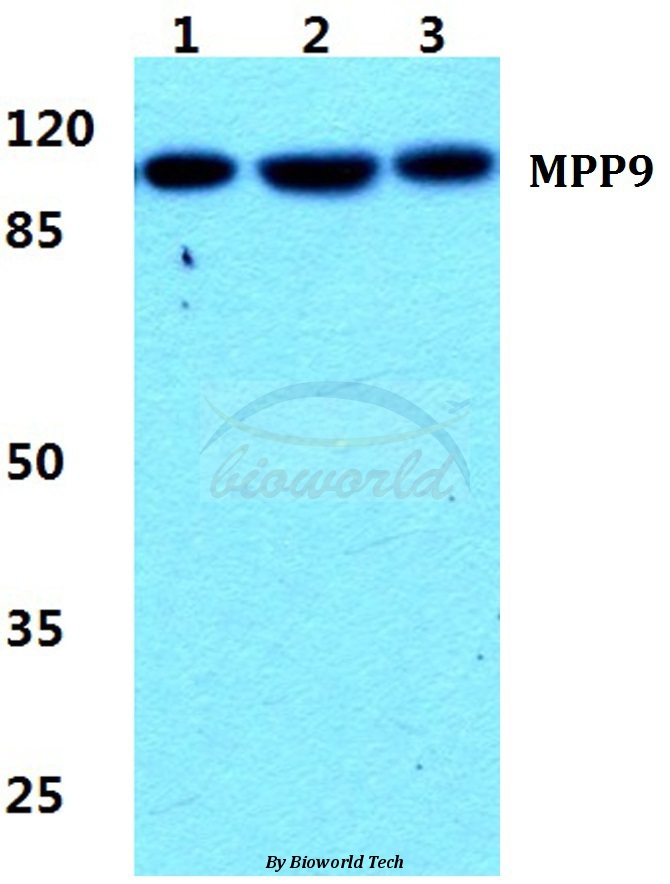Product Name :
MPP9 polyclonal antibody Background :
Progression of cells from interphase to mitosis involves alterations in cell structures and activities. The transition from G2 to M phase is induced by M phase-promoting factor (MPF). In M phase, many proteins are phosphorylated directly by MPF or indirectly by kinases activated by MPF. These M phase phosphoproteins (MPPs), also known as MPHOSPHs, permit disassembly of interphase structures and generation of M phase enzymatic activities and structures. MPP9 (M-phase phosphoprotein 9), also known as MPHOSPH9, is a 1,031 amino acid peripheral membrane protein of the Golgi apparatus that exists as two alternatively spliced isoforms. The gene encoding MPP9 maps to human chromosome 12, which encodes over 1,100 genes and comprises approximately 4.5% of the human genome. Chromosome 12 is associated with a variety of diseases and afflictions, including hypochondrogenesis, achondrogenesis, Kniest dysplasia, Noonan syndrome and trisomy 12p. Product :
Rabbit IgG, 1mg/ml in PBS with 0.02% sodium azide, 50% glycerol, pH7.2 Storage&Stability :
Store at 4°C short term. Aliquot and store at -20°C long term. Avoid freeze-thaw cycles. Specificity :
MPP9 polyclonal antibody detects endogenous levels of MPP9 protein. Immunogen :
Synthetic peptide, corresponding to amino acids 81-126 of Human MPP9. Conjugate :
Unconjugated Modification :
Unmodification
MPP9 polyclonal antibody Background :
Progression of cells from interphase to mitosis involves alterations in cell structures and activities. The transition from G2 to M phase is induced by M phase-promoting factor (MPF). In M phase, many proteins are phosphorylated directly by MPF or indirectly by kinases activated by MPF. These M phase phosphoproteins (MPPs), also known as MPHOSPHs, permit disassembly of interphase structures and generation of M phase enzymatic activities and structures. MPP9 (M-phase phosphoprotein 9), also known as MPHOSPH9, is a 1,031 amino acid peripheral membrane protein of the Golgi apparatus that exists as two alternatively spliced isoforms. The gene encoding MPP9 maps to human chromosome 12, which encodes over 1,100 genes and comprises approximately 4.5% of the human genome. Chromosome 12 is associated with a variety of diseases and afflictions, including hypochondrogenesis, achondrogenesis, Kniest dysplasia, Noonan syndrome and trisomy 12p. Product :
Rabbit IgG, 1mg/ml in PBS with 0.02% sodium azide, 50% glycerol, pH7.2 Storage&Stability :
Store at 4°C short term. Aliquot and store at -20°C long term. Avoid freeze-thaw cycles. Specificity :
MPP9 polyclonal antibody detects endogenous levels of MPP9 protein. Immunogen :
Synthetic peptide, corresponding to amino acids 81-126 of Human MPP9. Conjugate :
Unconjugated Modification :
Unmodification
-
 Western blot (WB) analysis of MPP9 polyclonal antibody at 1:500 dilution Lane1:Hela cell lysate Lane2:NIH-3T3 cell lysate Lane3:PC12 cell lysate
Western blot (WB) analysis of MPP9 polyclonal antibody at 1:500 dilution Lane1:Hela cell lysate Lane2:NIH-3T3 cell lysate Lane3:PC12 cell lysate
Bioworld Biotech only provide peptides for our antibodies and do not provide additional peptide customization services.
Price/Size :
USD 368/1mg/vial
Tips:
For phospho antibody, we provide phospho peptide(0.5mg) and non-phospho peptide(0.5mg).Describe :
Blocking peptides are peptides that bind specifically to the target antibody and block antibody binding. These peptide usually contains the epitope recognized by the antibody. Antibodies bound to the blocking peptide no longer bind to the epitope on the target protein. This mechanism is useful when non-specific binding is an issue, for example, in Western blotting (WB) and Immunohistochemistry (IHC). By comparing the staining from the blocked antibody versus the antibody alone, one can see which staining is specific; Specific binding will be absent from the western blot or IHC performed with the neutralized antibody.Formula:
Synthetic peptide was lyophilized with 100% acetonitrile and is supplied as a powder. Reconstitute with 0.1 ml DI water for a final concentration of 10 mg/ml.The purity is >90%,tested by HPLC and MS.
Storage:
The freeze-dried powder is more stable. For short time at 2-8°C. For long term storage store at -20°C.
Note :
This product is for research use only (RUO only). Not for use in diagnostic or therapeutic procedures.
 MPP9 polyclonal antibody
MPP9 polyclonal antibody  Datasheet
Datasheet COA
COA MSDS
MSDS SHIP
SHIP